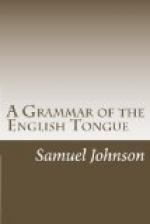A.
A has three sounds, the slender, open, and broad.
A slender is found in most words, as face, mane, and in words ending in ation, as creation, salvation, generation.
The a slender is the proper English a, called very justly by Erpenius, in his Arabick Grammar, a Anglicum cum e mistum, as having a middle sound between the open a and the e. The French have a similar sound in the word pais, and in their e masculine.
A open is the a of the Italian, or nearly resembles it; as father, rather, congratulate, fancy, glass.
A broad resembles the a of the German; as all, wall, call.
Many words pronounced with a broad were anciently written with au; as sault, mault; and we still say, fault, vault. This was probably the Saxon sound, for it is yet retained in the northern dialects, and in the rustick pronunciation; as maun for man, haund for hand.
The short a approaches to the a open, as grass.
The long a, if prolonged by e at the end of the word, is always slender, as graze, fame.
A forms a diphthong only with i or y, and u or w. Ai or ay, as in plain, wain, gay, clay, has only the sound of the long and slender a, and differs not in the pronunciation from plane, wane.
Au or aw has the sound of the German a, as raw, naughty.
Ae is sometimes found in Latin
words not completely naturalized or
assimilated, but is no English
diphthong; and is more properly
expressed by single e, as
Cesar, Eneas.
E.
E is the letter which occurs most frequently in the English language.
E is long, as in sc[=e]ne; or short, as in c[)e]llar, s[)e]parate, c[)e]lebrate, m[)e]n, th[)e]n.
It is always short before a double consonant, or two consonants, as in v[)e]x, p[)e]rplexity, rel[)e]nt, m[)e]dlar, r[)e]ptile, s[)e]rpent, c[)e]llar, c[)e]ssation, bl[)e]ssing, f[)e]ll, f[)e]lling, d[)e]bt.
E is always mute at the end of a word, except in monosyllables that have no other vowel, as the; or proper names, as Penelope, Phebe, Derbe; being used to modify the foregoing consonants, as since, once, hedge, oblige; or to lengthen the preceding vowel, as b[)a]n, b[=a]ne; c[)a]n, c[=a]ne; p[)i]n, p[=i]ne; t[)u]n, t[=u]ne; r[)u]b, r[=u]be; p[)o]p, p[=o]pe; f[)i]r, f[=i]re; c[)u]r, c[=u]re; t[)u]b, t[=u]be.
Almost all words which now terminate in consonants ended anciently in e, as year, yeare; wildness, wildnesse; which e probably had the force of the French e feminine, and constituted a syllable with its associate consonant; for in old editions words are sometimes divided thus, clea-re, fel-le, knowled-ge. This e was perhaps for a time vocal or silent in poetry as convenience required; but it has been long wholly mute. Camden in his Remains calls it the silent e.
It does not always lengthen the foregoing vowel, as gl[)o]ve, l[)i]ve, g[)i]ve.




